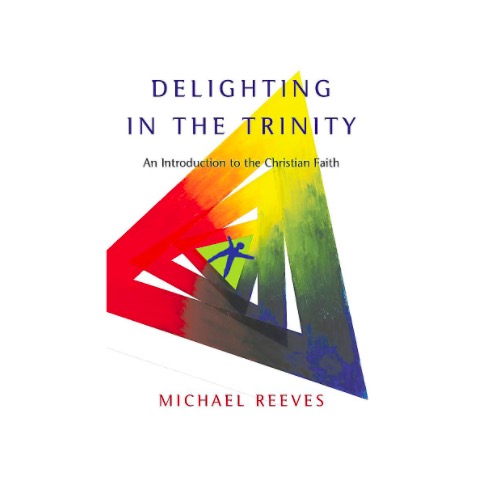Each month, you’ll hear from one of us on what we’re reading and a little bit about the book. This month we’re sharing book notes on Michael Reeves’, Delighting in the Trinity. Enjoy!
The triune nature of God is the foundation of our Christian faith, impossible to ignore and moving us to worship and delight as we come to understand Him more and more. Yet often we find the Trinity affirmed as a grand mystery and moved beyond or described as so confusing and incomprehensible that it is not worth attempting to wrap our minds around the truth God has revealed in His Word about Himself.

God as Trinity is certainly bigger than our minds can conceive and more wonderful than we could ever hope, and yet, He has given us His Word so that we might know Him. It’s because of this truth that we may love because God is love in His perfect unity and triune goodness. It’s because God is Trinity that we can be saved as the Father plans salvation, the Son secures it, and the Spirit seals it. And it is through the triune goodness of God that we might live the Christian life, as we are hidden in Christ, set free from the power of sin and empowered by the Spirit to be doers of the Word.
Broadening our understanding of this central truth about the God we serve is the focus of a book I recommend constantly to anyone who will listen: Delighting in the Trinity by Michael Reeves. I first read this book many years ago, and it encouraged my faith and gave me a fresh perspective on the God we serve. Over and over again, Reeves reminds us of the beauty of our triune God who is worthy of our delight. At just 130 pages (with many pictures/pages of a deeper dive into a particular concept or historical person or moment, I might add), it’s an accessible, easy read full of depth and sure to move your heart toward worship.
With just five chapters, an introduction, and a conclusion, this book can be read in one sitting if you excelled at Accelerated Reader growing up, or in a few nights, which is more my style. It is short, but it is dense, and you will likely find yourself reading and reading as you go, seeking to push these truths down deeper into your heart and mind.
In chapter 1, Reeves tackles the question: What was God doing before creation? I won’t give you all the spoilers, but here’s a poignant quote from Reeves on the topic:
“Such are the problems with nontriune gods and creation. Single-person gods, having spent eternity alone, are inevitably self-centered beings, and so it becomes hard to see why they would ever cause anything else to exist. Wouldn’t the existence of a universe be an irritating distraction for the god whose greatest pleasure is looking in a mirror? Creating just looks like a deeply unnatural thing for such a god to do. And if such gods do create, they always seem to do so out of an essential neediness or desire to use what they create merely for their own self-gratification. … Everything changes when it comes to the Father, Son and Spirit. Here is a God who is not essentially lonely, but who has been loving for all eternity as the Father has loved the Son in the Spirit. Loving others is not a strange or novel thing for this God at all; it is at the root of who he is.”2
Reeves goes on to cover creation, a beautiful picture of God’s love. He says, “So next time you look up at the sun, moon and stars and wonder, remember: they are there because God loves, because the Father’s love for the Son burst out that it might be enjoyed by many. And they remain there only because God does not stop loving. He is an attentive Father who numbers every hair on our heads, for whom the fall of every sparrow matters; and out of love he upholds all things through his Son, and breathes out natural life on all through his Spirit.”3
What might change in your life if you really embraced God’s love for you? Would your joy and delight be transformed into a brilliance reminiscent of Moses’ glow when he came down from Mount Sinai and the presence of God?
Reeves then discusses salvation in chapter 3, reminding us that it is because God is Trinity that we may be saved through the work of the Son. He writes, “Now if God were not triune, if there was no Son, no lamb of God to die in our place, then we would have to atone for our sin ourselves. We would have to provide, for God could not. But—hallelujah!—God has a Son, and in his infinite kindness he dies, paying the wages of sin, for us. It is because God is triune that the cross is such good news.”4
Chapter 4 discusses the work of God in our lives leading to changed behavior. This quote struck me in this chapter: “Christianity is not primarily about lifestyle change; it is about knowing God. To know and grow to enjoy him is what we are saved for … Nonetheless, getting to know God better does actually make for far more profound and practical change as well. Knowing the love of God is the very thing that makes us loving. Sensing the desirability of God alters our preferences and inclinations, the things that drive our behavior: We begin to want God more than anything else.”5
Lastly, Reeves concludes that worshiping our triune God is the only reasonable answer when we view His beauty. We are called to lay aside what we once thought to be desirable which led to death in order to fully surrender to the One Life-Giver. Reeves says it this way:
“We cannot choose what we love, but always love what seems desirable to us. Thus we will only change what we love when something proves itself to be more desirable to us than what we already love. I will, then, always love sin and the world until I truly sense that Christ is better.”6
We serve a triune God who is three Persons, yet One. There has been perfect unity and love within the Trinity since before the foundations of the earth were laid. This is the beautiful, delightful truth of our God! He is unlike any other!
“Indeed, in the triune God is the love behind all love, the life behind all life, the music behind all music, the beauty behind all beauty and the joy behind all joy.”7

Mary Wiley is the author of Everyday Theology, an eight-week Bible study exploring essential doctrines and why they matter in our everyday lives. She holds a BA in Christian studies and English from the University of Mobile and an MA in theological studies from The Southern Baptist Theological Seminary. She and her husband, John, have two children and live in the Nashville area. She works in publishing and you can follow her on Instagram.
1. Michael Reeves, Delighting in the Trinity (Downers Grove, IL: IVP Academic, 2012, 18).
2. Ibid., 41.
3. Ibid., 62.
4. Ibid., 73.
5. Ibid., 10.
6. Ibid., 101.
7. Ibid., 62.

